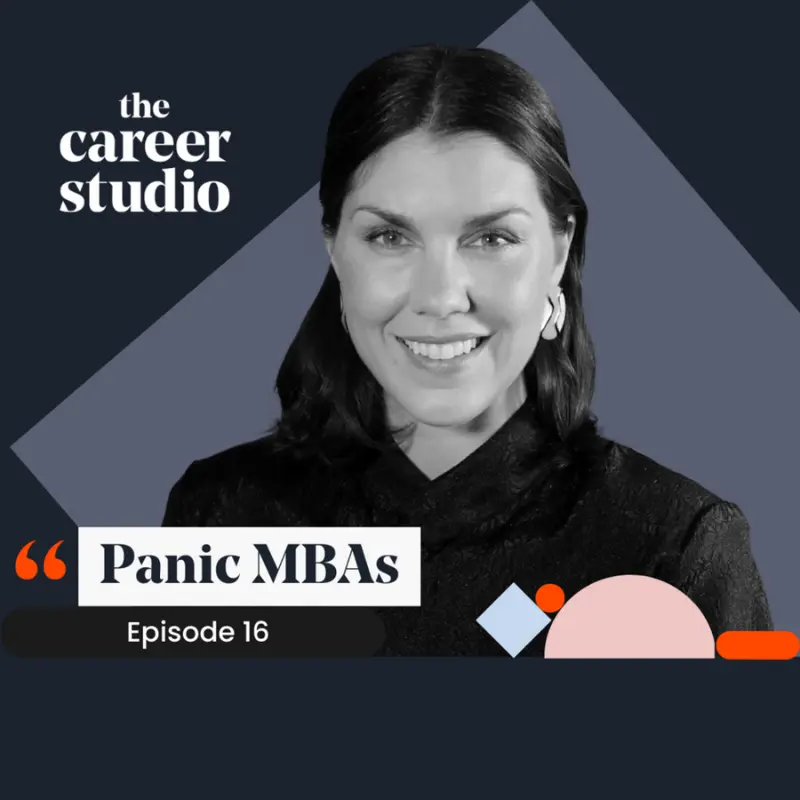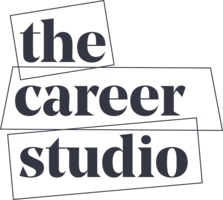Panic MBAs

We hate the discomfort of feeling lost. And when we’re lost we don’t know where to start to fix it. This is why so many people reach for another degree - I did this, I did an MBA. Another degree feels like a socially-sanctioned way of addressing your lost feelings. But then why do so many people graduate no more wiser as to where they’re going and what they want? Why are there so many post-MBA students frustrated and lost in the 5 years after graduation? It’s because the MBA was selected in panic as the solution for feeling lost. I recommend avoiding this costly mistake.
In this episode I cover.
- Why we tend to reach for secondary-degrees when we’re feeling professionally lost.
- The impact of panic MBAs on what you’re able to get out of the educational program.
- What to do instead when you feel lost professionally.
- How to decide on a secondary degree in a productive, intentional way.
Related episodes
Are you ready to create an energizing career you love?
You can create a career that is simply an extension of who you are and how you want to live your life. If this sounds like what you’re after then schedule a consultation. We'll get to the bottom of what's going on for you. And exactly where you need to focus to bring your career and life into alignment. It's free!
For more from The Career Studio
Transcript
Welcome to the career studio podcast, where we boil down the noise and focus on the core concepts, essential for building an energizing career you love. One that is simply an extension of who you are and how you wanna live your life. Anyone can do it. It's just a matter of knowing what to focus on.
Okay. Hello.Today I wanted to talk about Panic MBAs, which is a term that I've coined, based on my own experience. And it goes a little something like this. In general, obviously we wanna feel like we know where we're going professionally. We wanna be on a clear path. We wanna be building towards something. We wanna feel like the work we're doing is satisfying and growing us.
So when that stops, right, when work stops working, when we start to look ahead of us and don't like what we see, the tendency is to want to fix that feeling immediately, cuz it feels very uncomfortable to feel lost. I've talked a lot about this already on this podcast, but we hate that discomfort of ambiguity and, and we feel lost.
Right? When we feel lost, we don't really know where to start. This is often the issue that I meet people and they're feeling lost. They're feeling burned out, they're feeling demotivated, and it's hard to know where to start. And this is really why I built my whole business to help people know where to start to give people a roadmap when you're feeling lost or burned out, or demotivated professionally.
But most people don't have this. They aren't clear on where to start, and so what I see so many people doing in these moments is reaching for another degree. I did this, I did an MBA, and I come across a lot of people who reach for the MBA when they feel lost, but could be anything, doesn't have to be an MBA in the context of this conversation. It could be any sort of secondary degree.
So, why do we do this? First, you know, it feels safe. It's kind of this socially sanctioned way of spending your time, right? Because you're getting an education that's respected and you figure that you're gonna learn a lot about yourself and what you want through the program.
And it's kind of easy too, right? Obviously applying itself isn't easy, but you know, if you've generally found schools straightforward. Then the idea of picking a few schools, researching them, applying to the ones that you like, getting in, doing the coursework, graduating. That seems doable and it also seems super structured right? It seems like a solution to feeling lost. That is, as I said, socially sanctioned and respected.
You know, we, we also gravitate towards secondary education because this feels like action, right? We don't wanna feel like we're stalling. We want to feel like we're always making progress. And another degree feels like progress.
So, let me just add here that I did this. When I was 30, I realized advertising was not where I wanted to be long term, but I wasn't sure what to do next. I didn't know where to start. I didn't know what I wanted, and I panicked because I thought that 30 was way too old to feel lost. Obviously, 30 is not old at all.
30 is like a a baby adult, but that was my perspective at the time. And being the high achiever that I am, I was like, okay, well I don't know what to do and I'm so old , so I better quickly do my MBA now before I'm too old. And I'd seen all these people within my community, within my kind of educational background from college and from high school do MBAs.
This is what I grabbed onto as a way to not feel lost, and within six months, I've taken the GMAT, I applied to programs, and I got accepted into a one year accelerated MBA program four months later. So it was really a matter of months from deciding to do an MBA to being accepted.
And what happened to me then over the next year, year and a half is what I see frequently. I graduated my MBA with over a hundred K invested, and I was not very much clearer on what I wanted. I still felt lost, and I was even perhaps more lost than I was when I'd started. I'll just explain this a little bit further. And I have talked about this in other episodes, but I'm really gonna get into it.
I, I spent a whole year trying to fit myself into a mold that didn't quite fit. Every class I found difficult, apart from organizational behavior, a couple other classes here and there, and I really had to work twice as hard as all of my classmates to get passing grades. My strengths are not, quantitative or even thinking about big corporate business strategy and, and I really wasn't that interested in those topics either.
So this means I had to expend more energy than other people to do the same thing, which meant I burned out halfway through the program and I had to take the summer off instead of doing an internship like everyone. Equally, most of the roles that we're being recruited for and even the clubs that people were joining to support career exploration, I really wasn't excited about, you know, I wasn't excited about retail luxury and consumer goods.
I wasn't excited about investment banking or early stage tech startups. I just, I didn't care . And a lot of the roles I applied for, I did a whole round of, uh, management consulting interviews. I applied and, and went through that whole process because I thought I should, because I thought that was the type of role I needed. Right. I thought I needed to get some consulting experience on my resume in order to have the career I thought I should have, and, and I actually think it's quite lucky that I wasn't able to pass those interviews because I would've ended up in these environments that I definitely would not have thrived in.
And the job I actually ended up taking was one that recruited me on campus and I, and I took it because it ticked a lot of my boxes of what I thought I should want. It was a high growth tech startup. I was working for an ex McKinsey consultant, but you know, I, I will never forget, I really felt no excitement, no joy in landing that role in, in getting ready for that role in moving to New York for that role.
And, and this colored my whole experience in moving to New York in the first few years in this city. I was really so uninterested in the work that I'm doing, which is obviously how I was spending most of my time. I remember talking about it to other people and the people with me saying like, you don't sound excited. You sound almost embarrassed as you're presenting it. And really that decision to take that role kicked off another 18 months of confusion and boredom and depression and burnout, and I eventually got fired from another early stage startup in the same space.
And the issue here is that I hadn't even considered if an MBA was what I needed to begin with. I just panicked and I reached for it because it was a pre-packaged, socially sanctioned solution to how I was feeling. And, you know, don't get me wrong, I, I did figure out a lot about what I didn't want, and I made some really good friends around the world. But there was a very high financial, emotional, and physical cost.
So, don't make my mistake, do not do a panic MBA. Do not do a panic secondary degree of any kind. Because the actual problem is not that you feel lost. It is okay to feel lost. This is really normal in life. Who we are and what we want is always evolving, right? Who you are at 20 is different than 30 and 40 and 50, and so it is natural and inevitable that the things you want from your career and life will change as you yourself evolve. Well, maybe your parents did one thing for most of their career. That is not the case now. It is very normal to shift throughout your career or even reinvent yourself completely.
Okay, so the, the problem is not that you feel lost, right? Let's normalize feeling lost. The actual problem is that you think you have to rush out of this feeling. The problem is you think it's not okay to feel lost. The problem is not sitting in the confusion and giving yourself a chance to explore with intention.
The problem is rushing to have a solution to feeling lost. And the problem is thinking that a degree is going to solve this, but the nuance is this, like a degree is only a great option, if you are clear about the results you're expecting on the other end, right? Like if you are clear where you want to go and you have had the conversations and explored everything and determined that a degree is the best way for you to get where you're going, right? You know where you're going, and therefore you know how a degree is going to support that.
You know, when I think back about my experience at INSEAD, my my MBA program, There was a lot of students there who had done that work and who knew exactly how they wanted to spend their time. And INSEAD was an accelerated program. It was really only a year long, so it was even more important to know where you were going. And so the students that came into that program knowing, you know, I want a job at a large, you know, global luxury brand, or, you know, I wanna transfer into venture capital and I wanna go into investment banking, or I wanna be a consultant. The students that knew how the MBA was serving them were able to use the resources in a really efficient way where I had no idea.
I had no idea what I wanted to do, so I had to explore everything, which. in a 12 month accelerated program is a complete waste of time, right? Which only added to me working harder than everyone else. Not only was the coursework hard, but because I had no direction, I was going to everything, right? And so this meant I got to do less of the things I might have liked to spend more time on because I really wasn't going in with any kind of direction.
So, when work stops working, when you don't know how to fix it, when it is time to move on, but you are not sure what you want, do not panic. Don't reach for this seeming safety net of a secondary degree. I get why it's comfortable. I get why we reach for it, but it is a trap if you are not clear on where you're going and that you need the secondary degree to get there.
So instead, instead of reaching for the degree first, just make a list of who you are, right? What kind of roles do you like to do on teams within orgs? What kind of topics and products interest you? What kind of priorities do you have in terms of the place you work, the money you make, the structure of your team? And given all of that, what ideas do you have about where your career could go? And then start talking to people, doing those things.
Start having conversations. Keep having conversations, lots of conversations, and exploring until you can cross things off your list. Keep exploring until something clicks, right? I talk about this all the time. What it's gonna require you to do is sit in ambiguity, right? I know it's uncomfortable to feel lost, but you don't have to make that mean anything, it's normal. You are going to have to talk to people authentically, right? You're gonna have to reach out and have conversations, and not about getting a job, but being curious and asking questions about what's it like? How am I positioned? What would it take for me to get where you are? But what you're gonna have to do as part of those conversations is not hide.
Don't pretend to know more than you do. Don't pretend to look good. Ask genuine questions. Be as authentic and honest as possible. So you're gonna have to get comfortable in the ambiguity. You're gonna have to have conversations in a really honest and authentic way, and you're just gonna have to keep going, right? You're gonna have to stay organized about what you're figuring out and what you still need to know. But I promise you, if you keep having conversations, eventually you are going to..... something is gonna feel better than the other ideas. One pathway is going to keep drawing your attention, and that's when you can start to ask yourself, okay, do I need another degree to do this?
You know, eventually I found coaching and I needed, I needed some education for that, or I, I wanted, not every coach does education or does training, but I wanted to do that, right? So I had to do another degree then to get on this path after my initial MBA investment. But I knew that was the direction I wanted to head, and so then it allowed me to really approach that coursework and that experience with more intentionality, clear on how I was using it, and how it was supporting me to take my next step, what I wanted to get out of the program.
So if you approach it this way, this is going to create much more clarity, much more direction for you than just going straight to the degree because you're going to have spent time talking to people and exploring a bunch of ideas and deciding after you've learned a lot, deciding intentionally, this is the direction I wanna head. So you're gonna have way more clarity.
You are also going to create a network of people around you who can support you. Because if you're having lots of conversations and eventually you decide on a pathway, you are going to have had conversations with people who have supported you in making that decision. So you have a jumping off point of people who you have created relationships with who can support you in whatever you need to take that next step.
In this process doing that work, it's also gonna create a lot of self-confidence and trust in yourself because you've practiced sitting in ambiguity, you've taken action through your confusion, and you have developed clarity on the other side. So you have shown yourself that you can face a challenge, you can face confusion and uncertainty, and you can navigate it to create for yourself the information you need to make a decision that's right for you instead of defaulting to something like an advanced degree, where it's almost like you're saying this external organization is gonna solve my problems for me.
It's almost like you're skipping over all the personal work you need to do first. So actually doing the work is going to create self-confidence and trust in yourself, which is just going to serve you in spades for whatever you wanna do next in any area of your life.
And then finally, if you do choose to do the degree, as I said before, you're going to have much more direction for how exactly you want to use that degree, right? That means when you go in, you're gonna join the clubs that support the direction you want. You're gonna form the relationships with the professors that support what you want. A degree in educational system it's filled with information, right? You'll never be able to do it all and build all the relationships and do everything a hundred percent. You have to be judicious. With how and where you spend your time. And if you're not going into that degree, clear on why you're selecting it and how you wanna use it and where you wanna go on the other side, you will miss out on the full value of that degree.
You know, you'll be surface level on everything instead of really getting, going deeper, into the areas that would support you. And you're only gonna have this clarity if you do the initial work to explore where do I wanna go next? Why? And making that decision, does a degree serve me or not?
So remember, it is okay to feel lost at any age. You have not done anything wrong. This is totally normal. And, in most cases, you do not need another degree to solve how you feel. Just lean into the confusion and start exploring. This is how you build connection to yourself and your intuition and what matters to you. That's my spiel for the day. Have a great one.
Hey, if you're ready to create an energizing career you love, one that is simply an extension of who you are and how you want to live your life. Then I wanna invite you to schedule a consultation. We'll get to the bottom of what's going on for you. And exactly where you need to focus to bring your career and life into alignment. It's free. Just head on over to thecareer.studio/schedule to find a time that works for you, or if you're enjoying and getting value from these episodes, I'd love you to leave a short review on whatever podcast app you use.
This helps other people like you find and get value from the podcast too.



